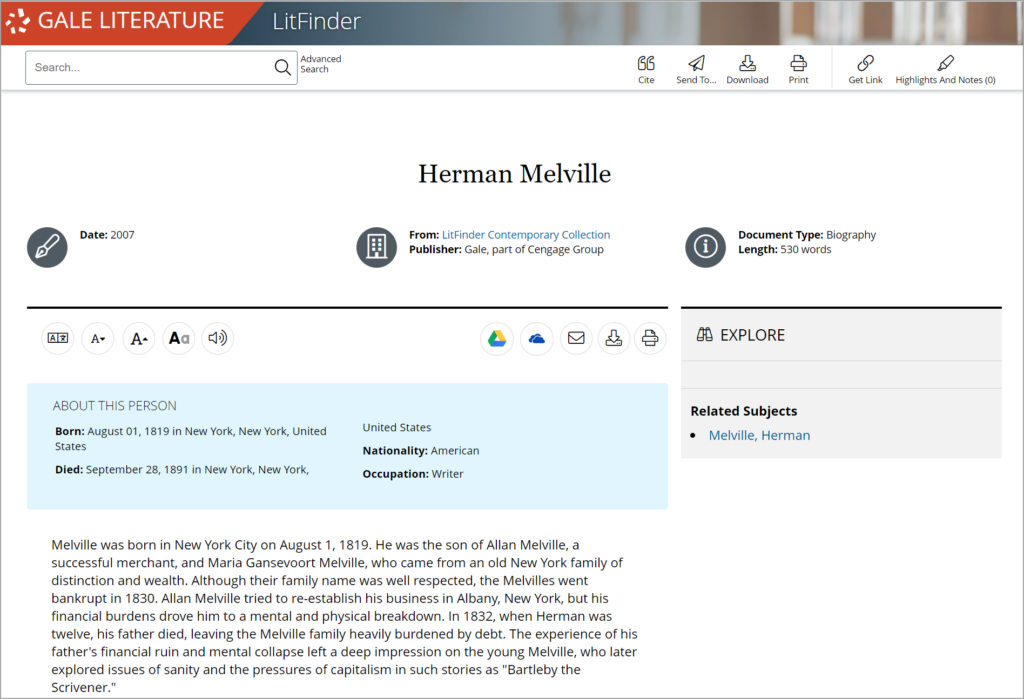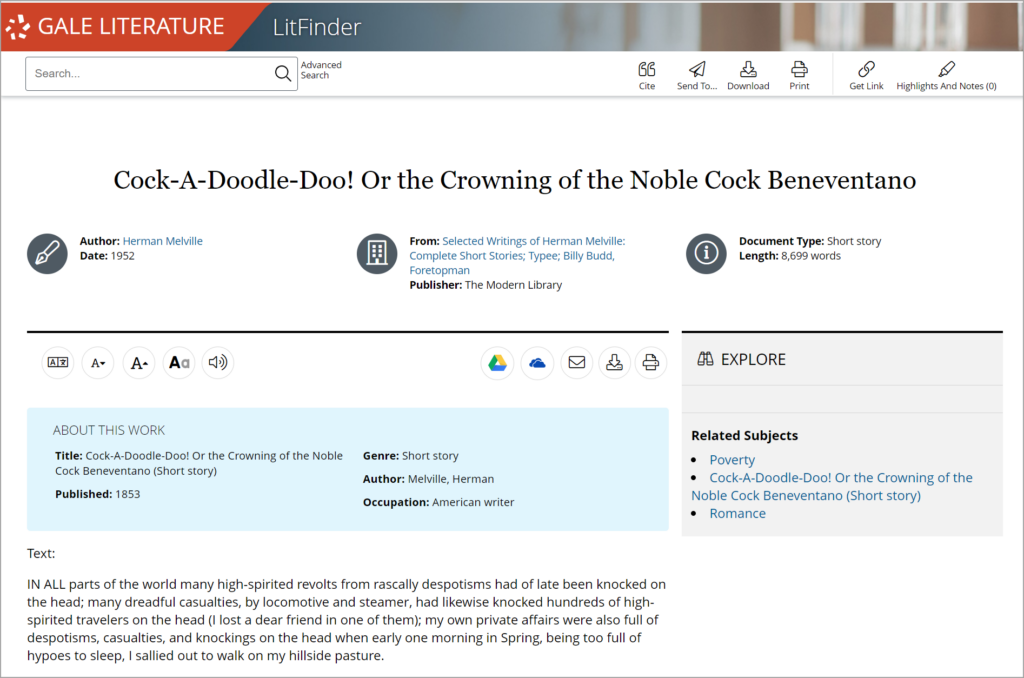| By Gale Staff |
For those who love great stories, it’s important to recognize and celebrate some of the truly momentous figures in literature. Herman Melville wrote one of the most recognized novels in modern American literature, Moby Dick, which most critics consider a masterpiece. Of course, like many literary giants, Melville’s talent was not appreciated until after his death. However, his readers can share his story and offer his memory the recognition he never received.
Herman Melville’s birthday is August 1, a perfect opportunity to place this author in the spotlight and explore his personal life and challenges. Provide essential literary resources for academic librarians, faculty, and students seeking content to celebrate literary figures with Gale Literature: LitFinder. With this digital solution, you can confidently integrate reliable, vetted information and full-text works into library programming, classroom instruction, and research. Whether you feature an epic quest like Moby Dick or a quirky novella like Bartleby the Scrivener, Gale resources can help faculty and students discover new perspectives and better understand Melville’s work.
The Man Behind the Whale
Herman Melville was born in New York City on August 1, 1819. One of seven children, Melville’s childhood was challenging. His father died early, spurring Herman and his siblings to leave school and pursue many jobs to make ends meet. He engaged in teaching, banking, and even working on a farm. Nonetheless, young Herman Melville was a voracious reader with a particular affinity for Shakespeare and history. He was also, unsurprisingly, captivated by the whaling industry and maritime culture, which were prominent in early nineteenth-century America. In 1839, Melville embarked on his first trip across the Atlantic Ocean. Thrilled by the experience, he soon joined the crew of a whaling ship, permitting him to travel to exotic islands and engage in wild adventures, which fueled his imagination for his later writing.
Often, an author’s life informs their work, but rarely are the parallels so strong as Melville’s experience compared to his writing. Introduce readers and researchers to Melville with the biographical entry in Gale Literature: LitFinder. Diving into a writer’s contemporary landscape and personal life helps readers connect the dots throughout their work. For example, the whale attack that sank the Essex, an American whaling ship, was a significant headline during Melville’s childhood and created the spark for the infamous Moby Dick. Later in Melville’s life, the writer’s own depression offers readers a window into the curious motivations (or lack thereof) behind his character Bartleby. Understanding Melville’s background and experiences helps inform the values and themes in his writing and grounds us in each story’s time and place.

His First Work
Melville’s first novel, Typee: A Peep at Polynesian Life, was published in 1846. The work is a compelling, if somewhat exaggerated, account of his time at sea. From the start, Melville develops specific themes within his writing style, most notably an indulgent attention to the details of maritime living. Typee tells the story of Tom, an adventure-seeking young man aboard a whaling ship named Dolly. After months at sea, the agitated protagonist abandons the ship, only to be captured by the cannibalistic, indigenous Typee tribe. Typee is based on some truth, though Melville was known to borrow from others and embellish for the sake of storytelling. However, his unique narrative style of a New Englander exploring indigenous cultures sparked an initial readership and launched his humble writing career.
Gale users can find the full text of Typee: A Peep at Polynesian Life in LitFinder and then easily navigate to a helpful literary explanation of the work. Melville uses his characters to observe the world around him, asking profound questions about race and the role of indigenous cultures against the rapidly growing influence of colonialism. He approaches unfamiliar cultural practices with genuine fascination and touches on themes of oppression, race, and slavery—topics still undeniably relevant to today’s readers.
An Exploration of Mental Illness
Herman Melville experienced early success as a writer, leading him to publish his pinnacle novel, Moby Dick. However, he was disappointed with its reception. At this point in the nineteenth century, the Wild West had captured the American imagination, turning interest away from Melville’s maritime themes. Despite his passion for writing the novel, readers largely ignored the work, and it sold just 3,000 copies in total during Melville’s lifetime. The book’s failure was costly to his career and exacerbated Melville’s struggles with depression. The Melville family also had a history of mental illness. His older brother, mother, father, and close friend all suffered mental health issues. Melville’s eldest son tragically died by suicide, and his youngest died of tuberculosis. Moreover, there are plenty of accounts of erratic behavior and suicide aboard whaling ships. Melville was surrounded by tragedy and suffering, and his writing adopted a similar darkness.
Melville fearlessly approached the subject of mental illness in several of his works. In “Cock-A-Doodle-Doo! Or the Crowning of the Noble Cock Beneventano”, the narrator tells the tale while experiencing the ebbs and flows of bipolar disorder. The title character, Bartleby, in Bartleby the Scrivener, undoubtedly suffers from depression, eventually dying from starvation in a jail cell. Melville’s novel, Pierre; or, The Ambiguities, is disjointed and deeply psychological—many critics consider the story a reflection of Melville’s mental state when he wrote it. Understanding Melville’s fascination and likely personal struggle with mental illness illuminates a running theme in many of his characters, offering even deeper insight into the stories.

Connect Readers to Academic Resources
Herman Melville is a fascinating figure providing academics with dozens of research avenues to explore. With LitFinder, students and faculty can easily find Melville’s original works in one database, plus secondary sources like biographical information and critical essays. In addition, researchers can effortlessly compile their bibliography with built-in citation tools. Gale Literature: LitFinder also includes valuable accessibility features that can help introduce Melville’s stories to a broader audience on your campus. Users can download results, leverage word-to-text audio files, and use extensive translation tools.
Throughout the academic year, you can rely on Gale Literature to connect students and researchers to insightful context for any author you choose to celebrate. The diversity of resources in Gale databases will enrich research and foster student critical thinking skills.
If your institution or library doesn’t subscribe to Gale’s literary resources, you can request a product trial or visit our website for more details.


